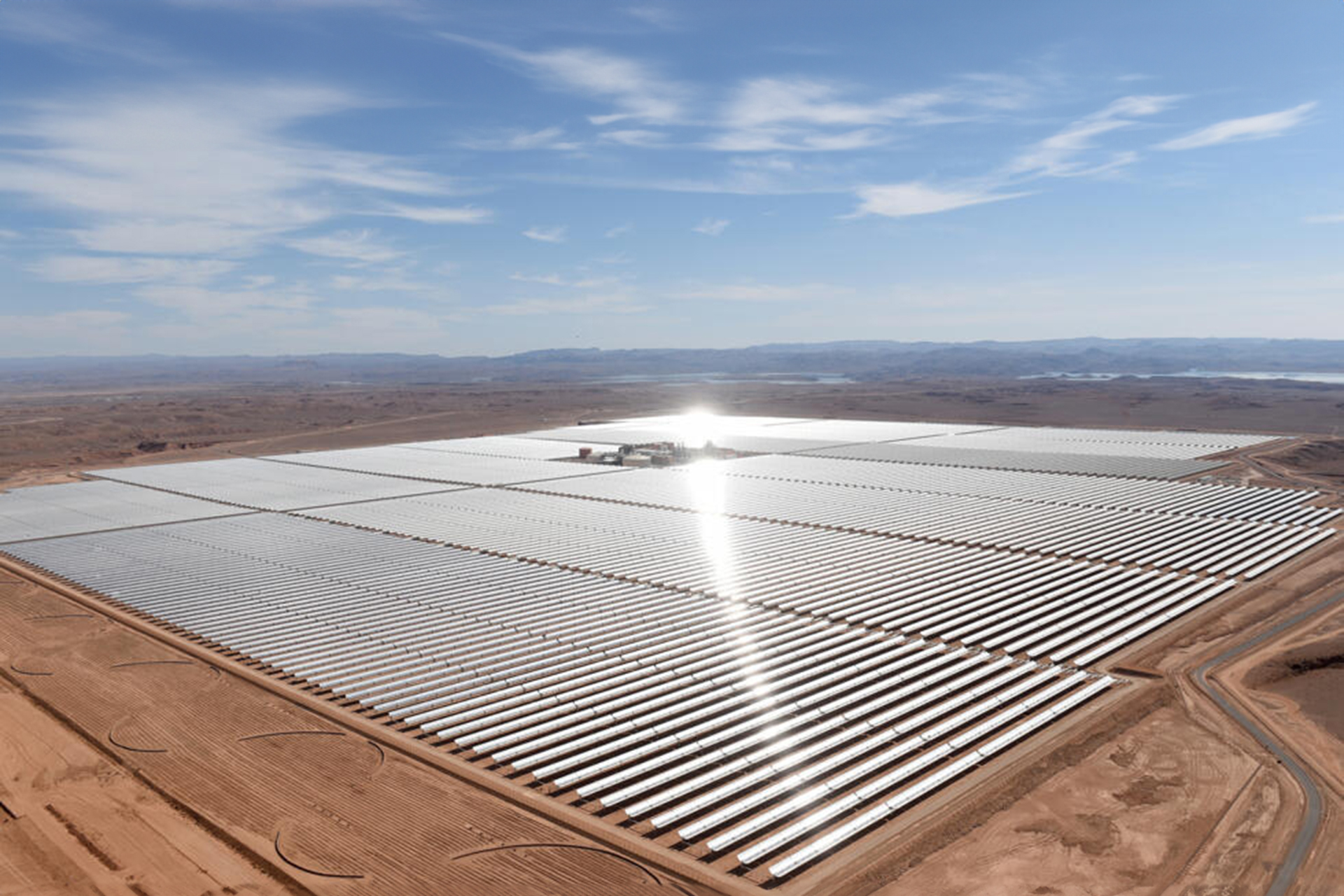An aerial view of solar mirrors at the Nour 1 solar power plant in southern Morocco (French)
Reuters quoted three sources familiar with the largest planned solar energy project in Morocco as saying that the reason for delaying the implementation of the project for years is a dispute over concentrated solar energy technology, especially after this technology caused the cessation of electrical production at another prominent station for a long period.
Morocco has set one of the most ambitious green energy goals of any developing country, as it aims for renewable energy sources to represent 52% of the
installed capacity by 2030, compared to 37.6% currently through investments in solar and wind energy plants in particular.
However, according to a Reuters report, Morocco has actually declined in the field of solar energy, because it has so far created only 831 megawatts, compared to the two thousand megawatts that were planned for 2020.
Wind energy has made up for some of the shortfall, but plants powered by polluting coal still make up most of the production.
Source of disagreement
The sources stated that construction has not yet begun on the “Noor Midelt 1” station, after it was scheduled to start operating this year, because the Ministry of Energy and the National Office of Electricity and Drinking Water - which operates the network - rejected the proposed concentrated solar energy technology.
The cost of the Noor Midelt 1 station is estimated at two billion dollars, with a capacity of 800 megawatts.
The Moroccan Sustainable Energy Agency (MASEN) awarded the contract to develop the “Noor Midelt 1” project to an economic consortium (consortium) led by the EDF Renewable Energy Company in 2019.
Morocco aims for renewable energy sources to represent 52% of installed capacity by 2030 (Associated Press)
Mazen Agency requested that the station contain:
Photovoltaic technology, which is cheaper, but has poor energy storage capacity.
Concentrated solar technology, which is more expensive, but continues to power the grid for hours after dark.
However, the National Office of Electricity and Drinking Water and the Ministry of Energy said - after the contract was awarded - that they would not agree to purchase the energy unless the agency abandoned concentrated solar power in favor of photovoltaics or switched from geothermal energy storage to batteries, the sources said.
The sources added that the agency and the National Office of Electricity and Drinking Water eventually signed an energy purchase agreement, but discussions between the agency and the consortium of companies on technological specifications are still ongoing.
Mazen Agency says that the project was delayed due to the Corona virus pandemic, but it is in the final development stage now.
It did not respond to a request from Reuters to comment on the dispute over the technology.
EDF Renewable Energy stated that Morocco has decided to resume development in 2022 with a combination of photovoltaic energy, concentrated solar energy, and battery-based storage.
She added that the project is “in the final development phase” and that all partners “remain committed.”
The Ministry of Energy did not comment directly on the problems with the Noor Midelt project, but said it was “trying to be as technology neutral” as possible as long as energy costs, sustainability and energy security were taken into account to avoid any unjustified risks.
The World Bank and the European Investment Bank said their conditions for financing the project remain valid as discussions continue between the Moroccan Agency for Sustainable Energy and the consortium.
The World Bank stated that construction will take 30 months once negotiations end.
Difficulties
The sources said that the National Office of Electricity and Potable Water cited problems in Nour Ouarzazate - the most famous solar energy complex in Morocco - as a reason for the Moroccan Agency for Sustainable Energy to push towards changing the technology in Nour Midelt.
Two of the sources said that technological problems stopped all production at the 150-megawatt station there for a year, starting in the summer of 2021.
A source familiar with the Noor Midelt project said that the “Noor Ouarzazate” complex helped put Morocco on the global map for large-scale renewable energy projects. But a closer look at the costs of operation and maintenance shows that the plant has become a burden.
“In retrospect, Ouarzazate was a testing ground for immature CSP technology,” another source said.
In a 2020 report, Morocco’s Economic, Social and Environmental Council recommended abandoning concentrated solar energy completely due to its high cost compared to photovoltaic energy and wind energy.
The Council's report stated that the Moroccan Agency for Sustainable Energy suffers a deficit of $80 million annually in the Nour Ouarzazate complex, because it sells energy at less than its production cost.
On the other hand, Mazen Agency - which launched the Nour Ouarzazate project - said that the complex showed “good performance in 2023, whether during peak hours or outside of peak times.”
She added that concentrated solar energy technology is a solution that provides storage, which helps meet the network's needs during peak hours.
Neither ACWA Power, which is developing the complex, nor the National Office of Electricity and Drinking Water responded to requests from press agencies for comment.
Source: Reuters

